Treatment for MS
Treatment for MS is in the research phase for decades already. There is currently no cure for multiple sclerosis (MS), but it is possible to alleviate MS symptoms with medications and other approaches.
At present time, the options for treatment for multiple sclerosis fall into three types – abortive therapies, preventative therapies, and symptomatic/palliative therapies.
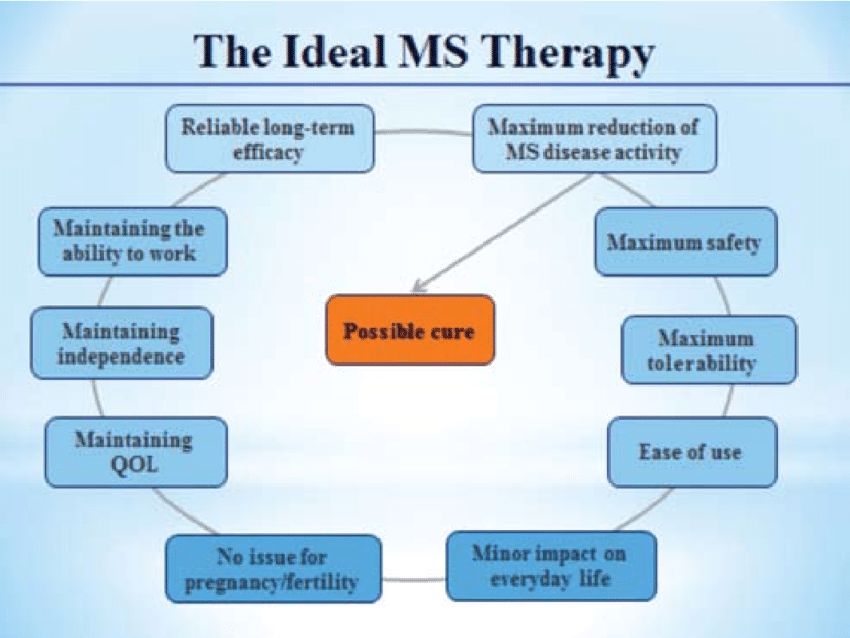
Abortive treatments for MS
An exacerbation (known as a relapse, flare-up, or episode) is defined as new or recurring neurological symptoms that develop within at least 24 to 48 hours and were not triggered by a metabolic cause such as fever. Flare-ups can impair your ability to function, so the goal of treatment is to speed up your recovery.
When symptoms of MS worsen, from time to time steroids are prescribed to shorten the duration and severity of the attack. These are not the steroids we hear about in the news from professional athletes.
Steroids used for the treatment of MS are known as glucocorticoids. Glucocorticoids reduce inflammation and are used for a variety of diseases and conditions (such as allergic reactions and asthma). Steroid use for multiple sclerosis usually involves giving methylprednisolone intravenously (through a vein in the arm) once a day for three to five days. Sometimes intravenous steroids are followed by steroid tablets in a gradually tapering dose for an additional 1 to 2 weeks.
Preventive treatment for MS
In the past 17 years, seven preventative treatments have been approved by the FDA to reduce the frequency and severity of multiple sclerosis flare-ups or to treat worsening MS. In short, these treatments for MS include:
- Interferon-beta-1a – beta interferon administered once a week by intramuscular injection or an interferon beta administered 3 times a week by subcutaneous injection.
- Interferon beta-1b – another form of interferon beta that can be given every other day by subcutaneous injection. The regimen for MS treatment with this medicine, however, may depend on the other specific types of therapies applied at the same time. All Interferon-beta medications aim to inhibit certain cells and processes of the immune system so that the known inflammatory process that occurs in MS is reduced.
- Interferon beta is known to cause various side effects. Usually, the list of side effects includes redness and mild discomfort at the injection site, flu-like symptoms including fever, chills, pain and fatigue, and changes in liver function. A blood test must be taken every few months for a safety check while someone is taking interferon. Other side effects may also occur, such as depression and changes in the menstrual cycle.
- Glatiramer acetate is a synthetic protein structurally similar to a component of myelin. It is injected daily under the skin.
- Glatiramer acetate is thought to stimulate the immune system to produce more anti-inflammatory immune cells, which then help reduce the inflammation seen in MS.
- Glatiramer acetate causes a variety of side effects, including redness at the injection site, itching, and swelling. Also, a small number of people may experience a short-term “post-injection reaction,” which includes redness, increased heart rate, fainting, and difficulty breathing.
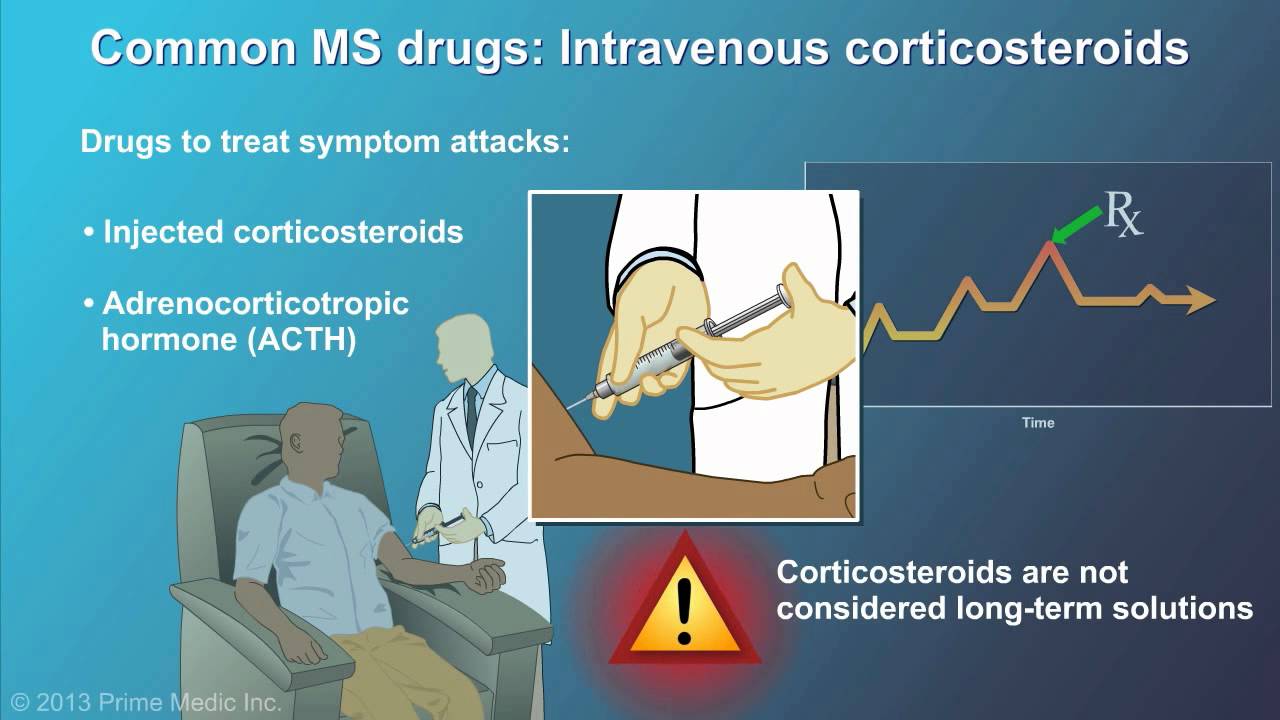
Interferons and glatiramer acetate are administered in the form of injections. Education programs were developed to help patients and families inject these drugs.
- Natalizumab – monoclonal antibody administered intravenously (through a vein in the arm) once every 4 weeks.
- Natalizumab works by blocking the ability of immune cells called lymphocytes to travel to the central nervous system (brain and spinal cord).
- Natalizumab has been associated with a rare, serious and potentially fatal brain infection known as PML (Progressive Multifocal Leukoencephalopathy)
- Mitoxantrone – a chemotherapeutic drug indicated in the case of worsening forms of relapsing and secondary progressive multiple sclerosis. It is given as an intravenous infusion every 3 months. Since this drug can be very toxic, it can only be given in a limited number of doses throughout life.
- Mitoxantrone works by suppressing the immune system and reducing the total number of immune cells that can cause inflammation in MS
- Mitoxantrone has been associated with a number of side effects, including cardiotoxicity
Symptomatic treatment for MS
Since the inflammation and damage caused by multiple sclerosis can disrupt normal nerve transmission in the brain and spinal cord, many symptoms can occur. Some of them can be transient and some can become permanent. Treating symptoms requires good communication between patient and physician, persistence, and often the experience of several specialists. The key goals of symptoms control are maintaining independent function and improving quality of life.
While medications are available to relieve many symptoms, they may only be part of the answer. Rehabilitation strategies such as physiotherapy and occupational therapy are often very helpful in improving and maintaining normal function. Consulting with specialists such as urologists, psychiatrists, and pain management specialists can be extremely helpful. Changes in mobility may require an orthotic specialist as well as an occupational physiotherapist.
What Is MS?
This disease affects your spinal cord and brain. When you have MS, your immune system attacks the myelin, which acts as a shield for your nerve fibers and disrupts the communication between the brain and the rest of your body. MS can cause deterioration of the nerves and permanent damage.
MS symptoms vary significantly from person to person, depending on which nerves get affected and the amount of damage. In severe cases, some people may lose their ability to walk, while others may experience very mild symptoms that require no treatment.
What are the causes of MS?
The causes of multiple sclerosis are unknown. Researchers accept as true that multiple sclerosis is caused by a mixture of reasons. Research is ongoing in the following areas to determine the causes of MS:
- immunology (study of the body’s immune system)
- epidemiology (study of the nature of diseases in large groups of people)
- genetics (understanding genes that may not function correctly in people with multiple sclerosis)
- infectious agents (e.g. viruses)
Understanding what causes MS will help in the process of discovering more effective treatment methods for this complicated illness and ultimately curing or even avoiding its occurrence.
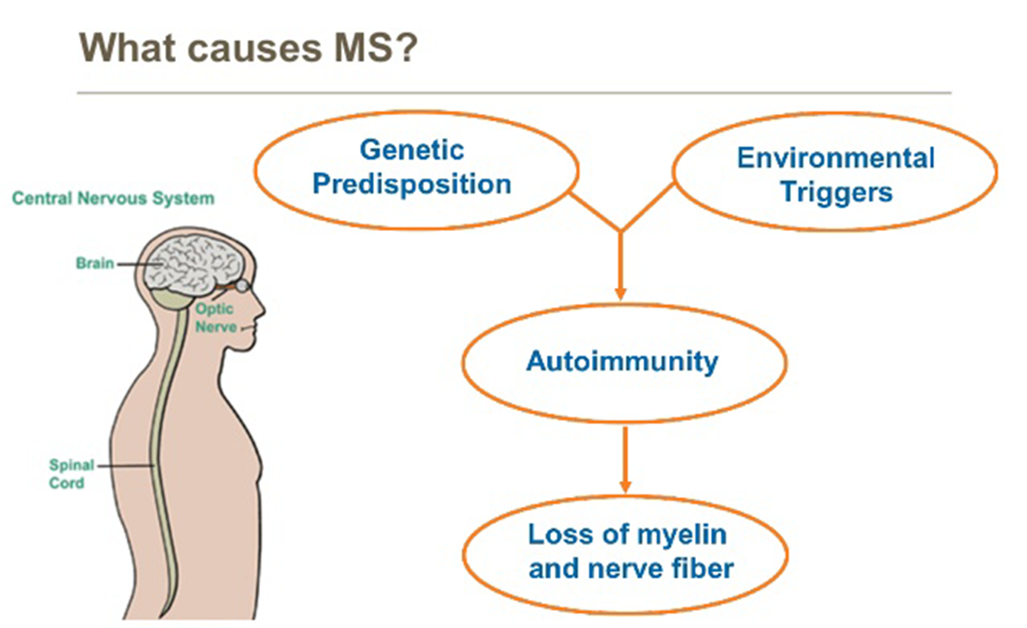
Immunologic Factors
Inside the human body affected by Multiple Sclerosis, an atypical immune retort causes inflammation and impairment to the central nervous system. Numerous different cells are involved in the anomalous immune reaction. Both T and B types are important cells for the immune system.
T cells are activated in the lymphatic system and, in MS, enter the CNS via blood vessels. The minute these cells appear in the central nervous system, T cells issue substances that cause inflammation and damage. This damages myelin, nerve fibers, and myelin-producing cells. T cells are also important in helping to activate B cells and invite other cells of the immune system to participate in the immune attack.
Regulatory T cells, a type of T cell, attenuate or deactivate inflammation. In MS, regulatory T cells do not function properly and do not effectively suppress inflammation.
Cytotoxic or “killer” T cells directly attack and destroy cells with certain characteristics
B type of cells is stimulated by the chemicals created by T cells. B cells produce antibodies and stimulate other proteins, which cause CNS damage in MS.
Researchers are continuing to search for other cells and processes that may be involved in multiple sclerosis. Ongoing efforts to learn more about the immune-mediated process in MS – what sets it in motion and how to slow it down or stop it – will bring us closer to understanding the cause of MS, the best therapies, and ultimately the cure.
Environmental Factors
Although the cause of MS is not known, more is being learned about the environmental factors that contribute to the risk of developing MS. There is no single risk factor that causes MS, but several factors are thought to contribute to the overall risk.
Geographic gradient
MS is known to occur more frequently in areas further from the equator. Epidemiologists – scientists who study the characteristics of the disease in large groups of people – examine geographic variations, demographics (age, sex, and ethnicity), genetics, infectious causes, and migration patterns to understand why.
Multiple clinical studies have revealed that patients born in high-risk geographical areas for MS who moved or migrated to low-risk areas before the age of 15 assume the risk of their new area. These data suggest that exposure to certain environmental agents before puberty may predispose a person to develop MS later.
MS “clusters” – the perception that a very large number of cases of MS have occurred in a given time or place – can indicate an environmental or genetic risk for the disease. To date, cluster studies in MS have not provided clear evidence of the existence of one or more causal or triggering factors in Multiple Sclerosis.
Vitamin D
There is growing evidence that vitamin D plays an important role in multiple sclerosis. Low blood levels of vitamin D have been identified as a risk factor for the development of multiple sclerosis. Some researchers believe sun exposure (a natural source of vitamin D) may help explain the north-south spread of multiple sclerosis. People living closer to the equator are exposed to more sunlight throughout the year. As a result, they tend to have higher levels of naturally-produced vitamin D, which is believed to support immune function and may help protect against immune-mediated diseases such as multiple sclerosis.
Smoking
There is also growing evidence that smoking plays an important role in multiple sclerosis. Research has shown that smoking increases the risk of developing multiple sclerosis and is associated with more severe illness and faster progression. Fortunately, evidence also suggests that smoking cessation – before or after the onset of multiple sclerosis – is associated with a slower progression of disability.
Obesity
Several clinical studies have reported that obesity in childhood and adolescence, especially in girls, increases the risk of later developing MS. Other studies have discovered that obesity in young adults age can also contribute to an increased risk of developing MS. Additionally, obesity can contribute and increased MS activity in people already diagnosed with Multiple Sclerosis.
Infectious factors
Many viruses and bacteria, including measles, distemper, human herpes virus-6, Epstein-Barr virus (EBV), and Chlamydial pneumonia have been or are being investigated to find out if they are involved in the progress of MS. EBV, the virus that causes mononucleosis, has received considerable attention in recent years. A growing body of research indicates that a previous EBV infection contributes to the risk of developing MS.
Genetic factors
MS is not a hereditary disease, in the sense that it is not a disease that is passed down from generation to generation. However, there is a genetic risk in MS that can be inherited. Among the general population, the risk of developing Multiple Sclerosis is approximately 1 in 750 – 1000. In identical twins, if one twin has MS, the risk of the other twin developing MS is about 1 in 4. The risk of developing MS is also about 1 in 4. Developing of MS, however, is amplified when other first-degree ancestors (parents, siblings, and children) suffer from Multiple Sclerosis, but much less than in identical twins.
About 200 genes have been identified, each contributing a small part to the overall risk of developing MS. Research is underway to better understand genetic risk and other factors that contribute to the development of MS.
Unproven theories
There have been many theories suggested and researched as possible causes of MS, but many do not have enough evidence to support whether they could be a cause of MS. Some of these theories are:
- Environmental allergies
- Exposure to pets
- Heavy metal exposure – mercury (including mercury amalgam dental fillings), lead, or manganese.
- Organic (chemical) solvents
What are the symptoms of MS?
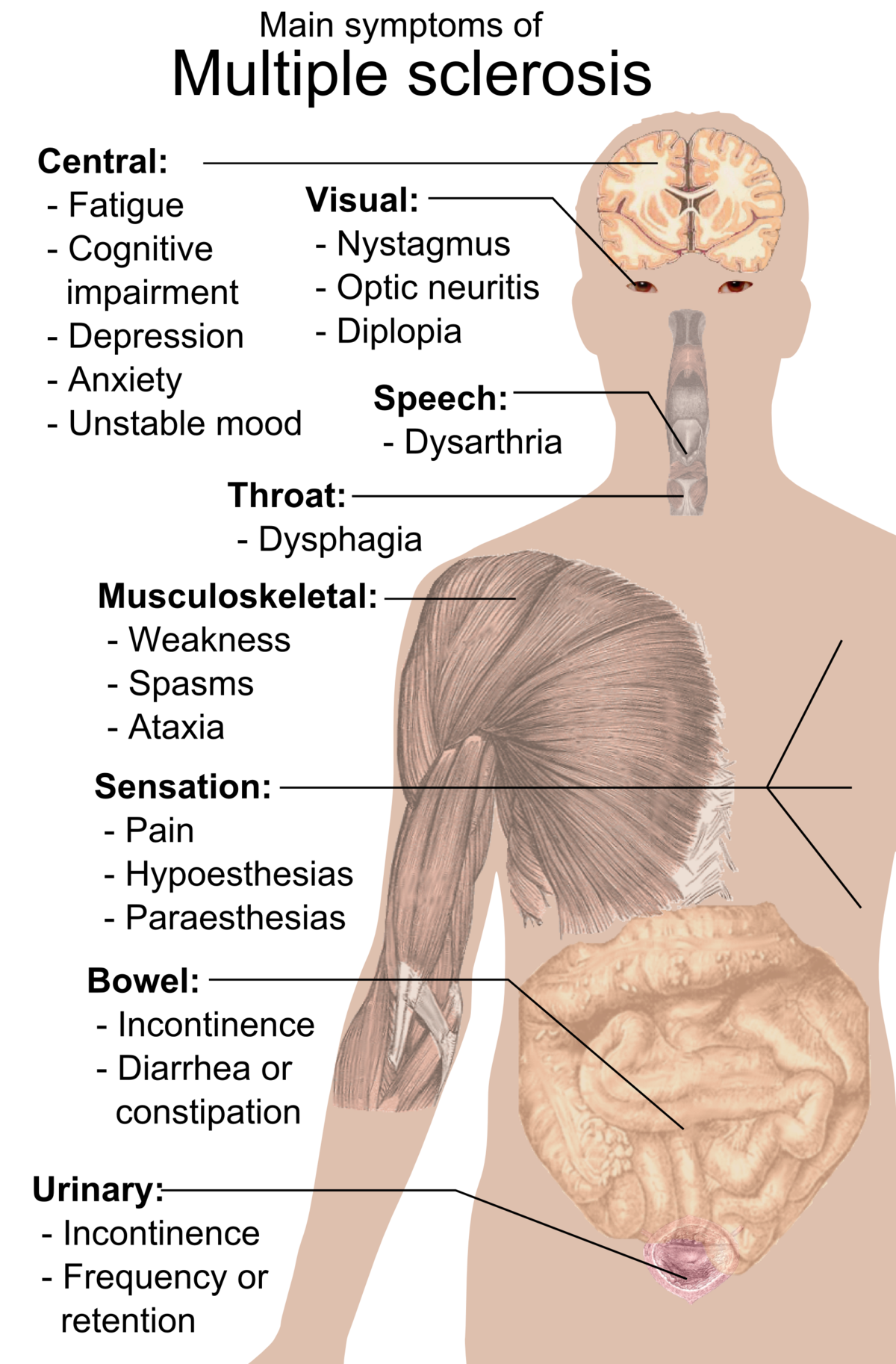
MS symptoms vary greatly. Generally, it affects movement. Symptoms of MS may include:
- Tremor, unsteady gait, or lack of coordination
- Particular neck movement may induce sensations similar to electric shocks
- A feeling of weakness or numbness in one or more limbs. Generally, it affects only one side of your body.
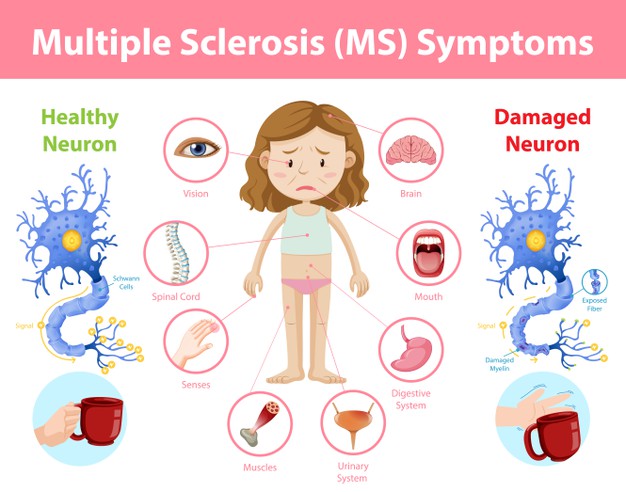
You may also experience vision problems such as:
- Blurry vision
- Prolonged double vision
- Complete or partial loss of vision
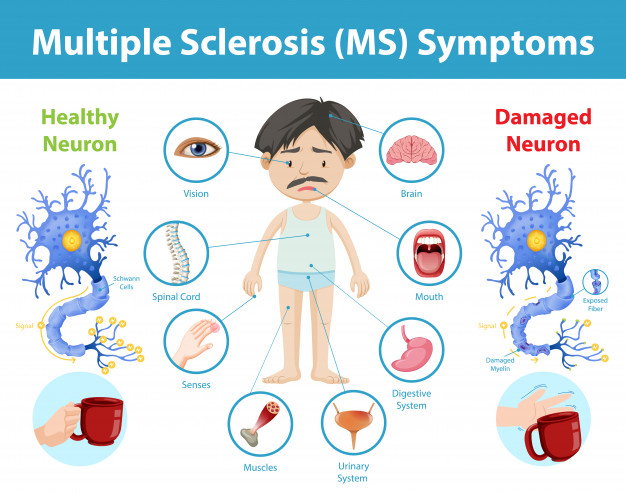
Other symptoms of MS are:
- Bladder, bowel, and sexual function problems
- Pain or tingling sensation in parts of your body
- Dizziness
- Fatigue
- Slurred speech
Natural Treatment for Multiple Sclerosis
Natural treatment for MS is what most of the patients who are suffering from this serious disease are looking for. For people who have multiple sclerosis (MS), sadly, there is no cure. Treatment of MS often focuses on quick recovery from attacks, minimizing the symptoms, and slowing the progression of MS. However, some people’s symptoms of MS are so mild that they require no treatment. Generally, conventional treatments for Multiple Sclerosis and medications are prescribed to deal with MS in those cases. However, the use of medications for MS can come with adverse side effects.

Currently, there has been increased attention to Natural treatment for Multiple Sclerosis to deal with MS. They can provide you with an effective and safer Natural remedy for multiple sclerosis
Here are some excellent natural remedies for multiple sclerosis that can aid you in dealing with the symptoms.
Homeopathy – #1 Natural Treatment for MS
Homeopathy remains one of the most effective and popular natural treatments for MS. Homeopathy for MS assumes the use of various combinations of remedies that can help find relief from various MS symptoms.
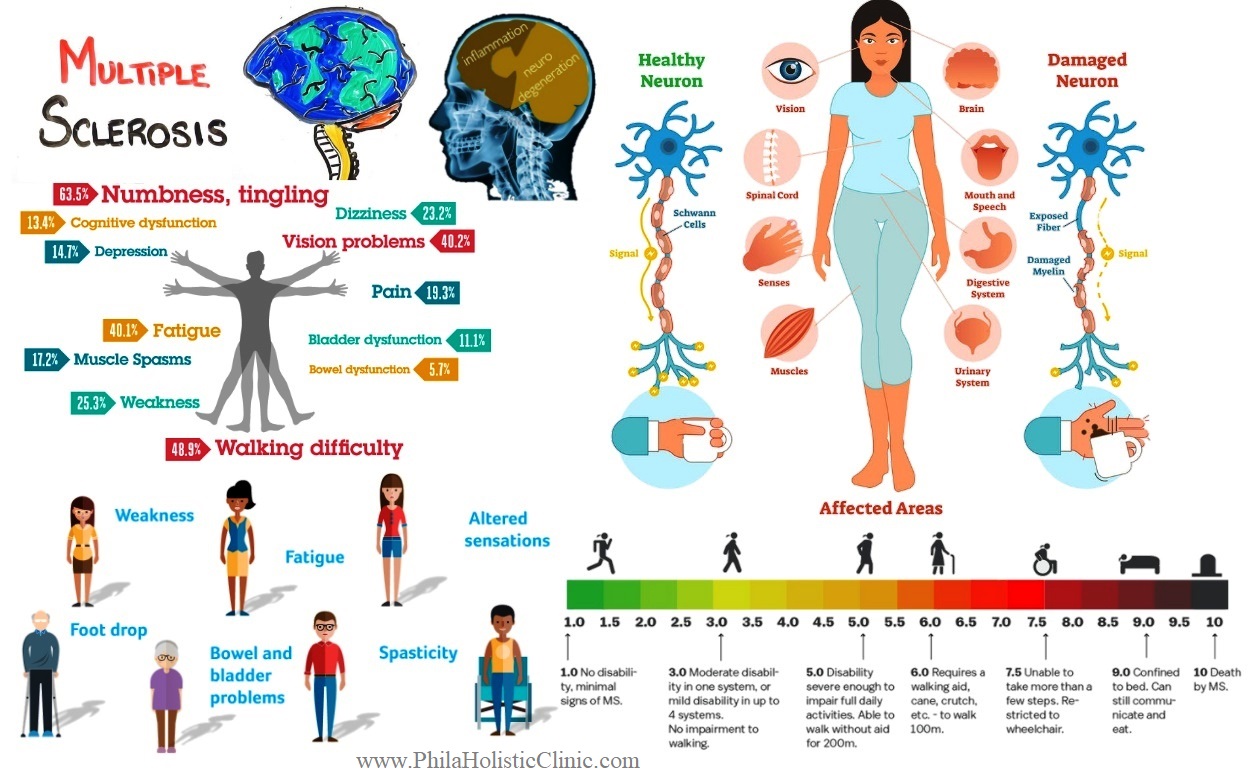
- Gelsemium & Physostigma: These are the most effective remedies for dealing with eye complaints. Physostigma is a potent homeopathic remedy for partial loss of vision, dim vision, eye pain, and dim vision. For MS patients with optic neuritis, Gelsemium is the best homeopathic remedy.
- Lathyrus Sativus: If you’re experiencing MS with spasticity, Lathyrus Sativus is a potent homeopathic remedy. It’s particularly ideal for MS with spasticity on the legs. Your legs will feel rigid, along with a spastic gait.
- Argentum Nitricum & Conium: If you’re experiencing weak limbs due to MS, Argentum Nitricum and conium are very effective homeopathic remedies. Conium can effectively treat weary legs, leg stiffness, painful gait, and sudden loss of strength. Argentum Nitricum is the best homeopathic remedy for cal muscle weakness, a sensation of heaviness on your limbs, and an unsteady walk.
- Alumina & Gelsemium: For balance and coordination, symptoms from MS, alumina, and Gelsemium are the best homeopathic remedies. It is also often accompanied by an unsteady and slow gait. Intense dizziness is also common.
Homeopathic remedies for MS as well as herbs for MS are not just useful but are also considered safe. Under the supervision of a qualified homeopath, the root cause of your symptoms can be ascertained, and the best homeopathic remedy for your particular condition can be scientifically selected and recommended.
Acupuncture – an ancient Chinese Natural Treatment for MS
Acupuncture is an excellent natural cure for MS. By carefully evaluating your current condition and medical history, an acupuncturist can get to the root of your problem and provide specific treatment for your particular symptoms and provide long-term relief. Acupuncture for MS is particularly ideal for dealing with symptoms of tingling and numbness, depression, bladder problems, spasticity, and pain. Research shows that acupuncture is beneficial in helping find relief from chronic conditions.

However, it should be noted that it’ll require multiple sessions with your acupuncturist to get results. Acupuncture also works excellently as a complementary therapy. Ideally, it would be best if you combined it with other alternative or conventional treatments to get the best results. As a Natural treatment for S, acupuncture is an excellent choice.
Yoga – exercise-based home remedy for MS
Yoga is also another excellent natural treatment for MS. It is particularly beneficial for mitigating symptoms of MS, such as fatigue, tension, and spasticity. Additionally, it is also very useful in improving circulation, digestion, focus, balance, posture, flexibility, strength, pelvic floor health, and elimination. Additionally, yoga has various health benefits and can lead to a general improvement in the quality of life. Being a part of a yoga group of MS patients can also provide you with emotional support.

Many studies show that yoga is effective in dealing with MS symptoms and can lead to enhanced limb strength, kinesiophobia levels, walking speed, self-efficacy, balance, step length, walking speed, ankle movements, and hip and pelvis angles. In conjunction with other treatments, the effects can be even more beneficial.

A huge advantage of trying yoga as a Natural cure for MS is that it causes no side effects. You should consult an experienced yoga instructor to figure out the best poses to deal with your symptoms.
Chinese Herbal Remedies – effective and safe natural treatment for Multiple sclerosis
You can also consider some Chinese herbs for MS to find relief from your symptoms. Some herbs for MS that can provide results include:
- Ginkgo Biloba: This herb is very effective for dealing with vision and eye problems. It can also help deal with overactive nerve responses and relieve nerve pain.
- Gotu Kola: This traditional Chinese herb can improve eye problems, skin conditions, fatigue, inflammation, and swelling. You can find this herb in various forms and is generally considered safe.
- Myrrh: This herb has been used for centuries, thanks to its excellent medical properties. It can provide relief from MS symptoms. It has antiseptic properties and can help with rheumatic and circulation problems. Myrrh also possesses anti-inflammatory properties.
These Chinese h herbs for MS are effective natural remedies for multiple sclerosis. With other treatments and remedies, they can provide effective relief from MS symptoms.
Natural treatment for MS in Philadelphia
As of now, there is no known permanent treatment for MS. Multiple Sclerosis can deteriorate diminishing the quality of life and preventing you from carrying out even regular routine tasks. But with the right natural treatment for MS, the severe symptoms can be reduced to such an extent that you’ll feel like the disease doesn’t even exist, and MS will not hinder your life in any way.
If you’re not happy with the results from conventional approaches or simply want a safer alternative, natural remedies for multiple sclerosis can be a valuable option.
At the Philadelphia Holistic Clinic, we have different departments (homeopathic, acupuncture, medicinal herbs, etc.) that work with MS patients and because all these departments reside under one roof you can get the most complex natural treatment for MS here.
Contact our clinic (267) 284-4305 to schedule your initial evaluation and further treatment or do it online.
Comments
Post a Comment